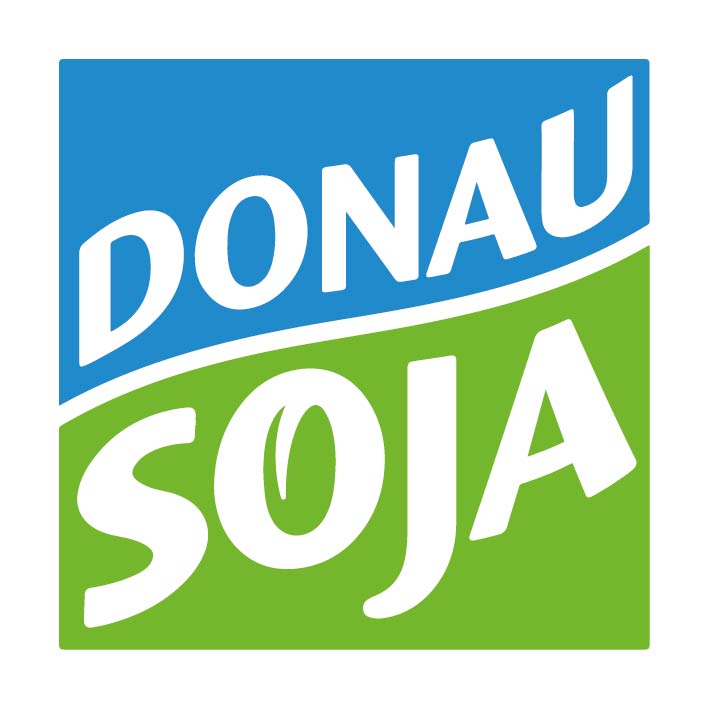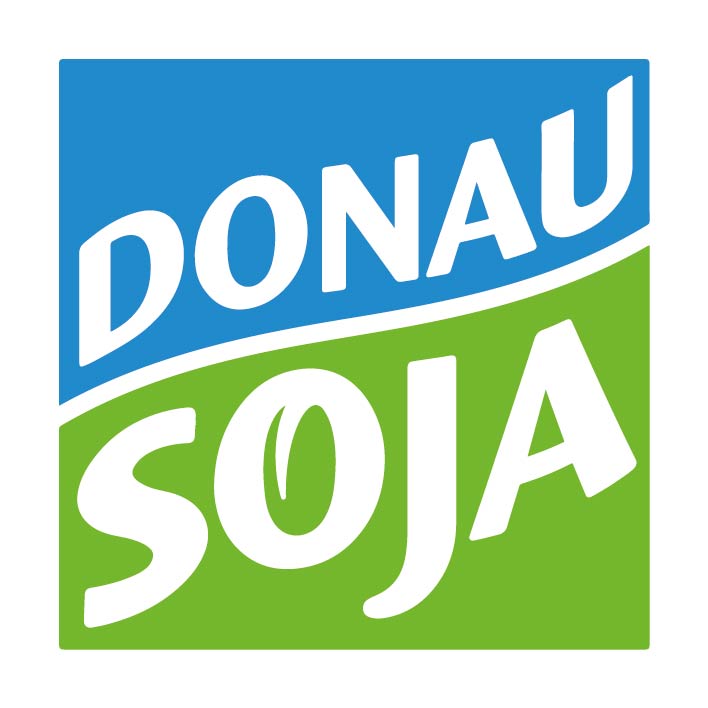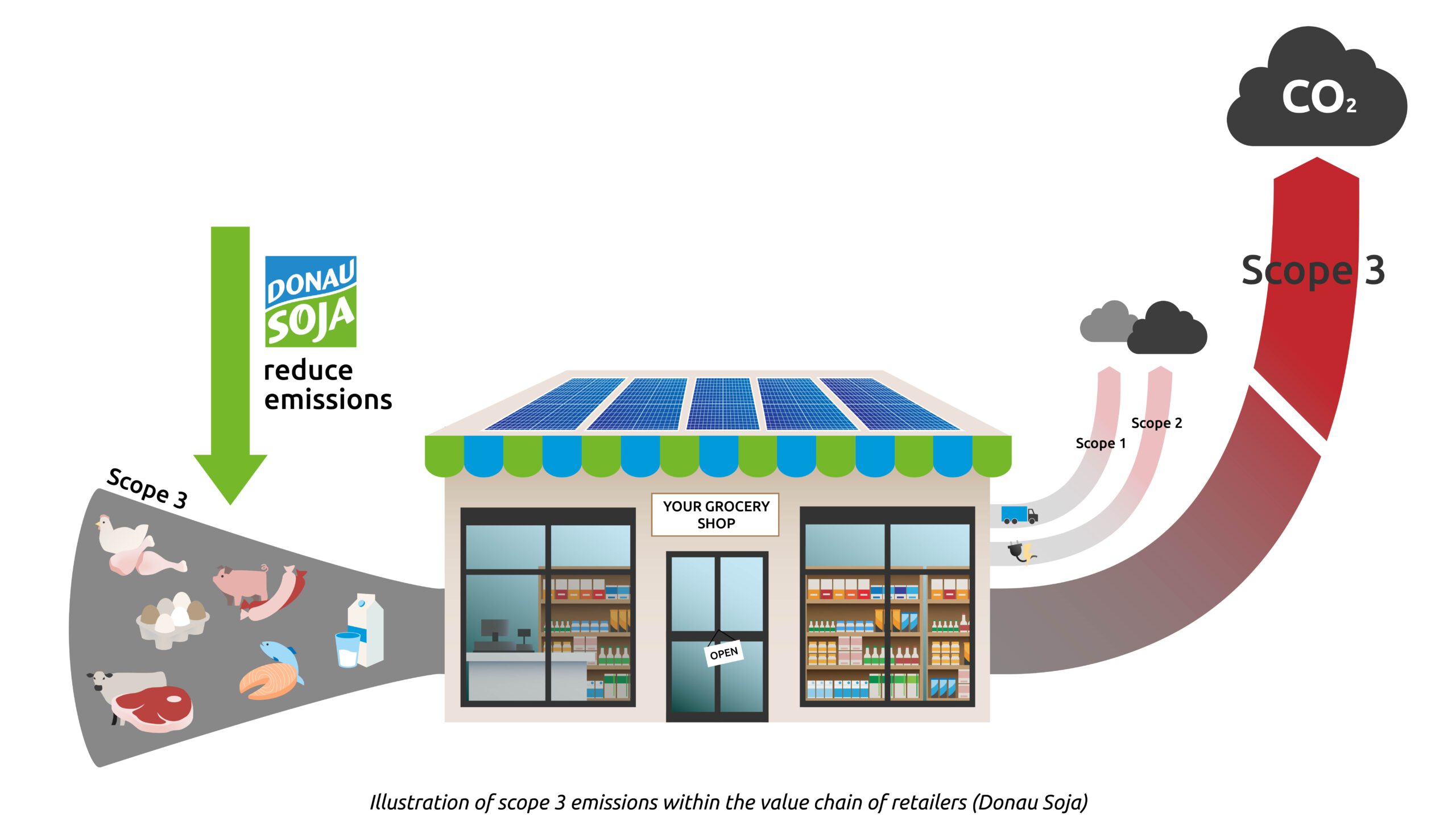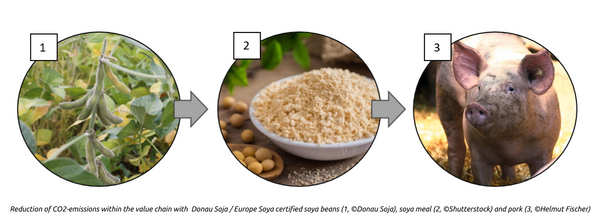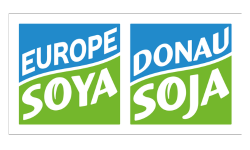Scope 3 emissions represent the hidden – or indirect – Greenhouse Gas (GHG) emissions within a company’s supply chain and are responsible for the For retailers, for example, these emissions constitute the lion’s share of their total GHG emissions through the thousands of products, especially animal-based products, in their assortment. Through the use of Donau Soja / Europe Soya certified soya beans, companies that produce or sell animal-based products, can significantly reduce the emissions along their supply chain.
Large companies like retailers are required to report on their GHG emissions, which consist of scope 1, scope 2 and scope 3. The scope 3 emissions of retailers consist of all emissions created throughout the value chains, from the farmers to the grocery stores and the consumers. Therefore, scope 3 accounts for up to 90% of retailers’ overall emissions.
Especially scope 3 emissions of animal-based products have a huge impact on the environment due to the use of soya in the animal feed. Most of the soya is imported from South America, where forests are being cleared and valuable ecosystems are converted into agricultural land on an unimaginable scale, leading to large CO2-footprints of animal products.
Donau Soja and Europe Soya exclude deforestation and land conversion with an early cut-off date (2008). Studies have shown that switching to Donau Soja / Europe Soya certified soya feed significantly reduces emissions by up to 40% in animal-based products. Donau Soja provides the relevant datasets to calculate CO2-emissions of soya beans and derived products, and as such supports its members and certified partners in their voluntary and mandatory reporting obligations for CO2-emission reduction.
How Donau Soja Supports Tackling Scope 3 Emissions
Donau Soja / Europe Soya certified supply chains ensure that soya is only cultivated on land that was dedicated for agricultural use not later than 2008 and therefore protect valuable ecosystems. This is one of the reasons why the CO2-footprint calculations of Donau Soja / Europe Soya soya beans show a reduction of up to 90% compared to non-certified soya beans from overseas, and 50% compared to conventional European soya beans. This environmental benefit can be also shown along the supply chain.
Studies by the Research Institute for Organic Agriculture (FiBL) Austria, have shown a significant reduction of CO2-emissions by using Donau Soja / Europe Soya certified soya beans in processed soya feed and animal-based products.
For example, a study on Europe Soya certified soya meal produced by AdamPolSoya (ATK Group) showed a reduction of up to 82% compared to Brazilian soya meal and a reduction of 56% compared to soya meal from European soya bean mix respectively.
Another study on the carbon footprint of pork from the premium brand EDEKA Hofglück showed that the use of Donau Soja / Europe Soya certified soya meal in pig feed leads to a reduction of up to 40% of CO2-emissions in the end products compared to regular feed.
Calculate your Emissions
Companies interested in conducting Life Cycle Assessments (LCAs) and Carbon Footprint calculations of scope 3 emissions along the value chain in accordance with SBTi FLAG can use the Donau Soja / Europe Soya datasets for certified soya beans, available as a so-called “branded dataset” via Blonk Consultant’s Agri-footprint database and GFLI database. Datasets are available in SBTi compliant format. The data includes values on the carbon footprint as well as data on other environmental categories such as land use change, ecotoxicity, freshwater use and many more.
Sustainability Reporting Obligations: from SBTi to CSRD
Large companies such as reailers are subject to various voluntary and legal requirements to report their CO2– emissions, incl. scope 3. The most widespread and recognised is the coluntary Science Based Targets initiaitve (SBTi). Coming legal requirements that oblige companies to report and reduce their CO2– emissions incl. Scope 3 are the CSRD and CSDDD.
The reporting frameworks emphasise the importance of scope 3 emissions in achieving sustainability goals and require companies to account for these emissions in their sustainability reporting and target setting. This reflects the fact that companies’ environmental impact extends beyond their direct operations to their entire value chain.
Science Based Target initiative (SBTi)
The SBTi is a voluntary scheme for companies to reduce their GHG on a science-based path.
Since 2015, >7,000 companies have committed to the SBTi. Specifically for the Forest, Land and Agriculture (FLAG) sectors, a guidance has been release to set more specific targets . Companies that submit a target for SBTi-validation complete a scope 3 inventory. If a company’s scope 3 emissions are 40% or more of their total emissions, a scope 3 target is required.
Corporate Sustainability Reporting Directive (CSRD)
Companies are required to report on impacts and risks arising from their activities on people and the environment.
Start date originally planned 2025 for the reporting year 2024*.
Companies are required to disclose data on the impact of their activities on the environment, incl. carbon emissions, as well as social and governance topics (so-called ESG reporting). In the field of carbon emissions, activities must be aligned with the 1.5-degree goal. The CSRD is on one level with financial reporting obligations and must be audited annually. SMEs can be affected by contractors and subcontractors.
Corporate Sustainability Due Diligence Directive (CSDDD)
It is planned that companies will be required to identify and prevent negative impacts on human rights and the environment in their own operations, subsidiaries and value chains from 2027 on.**
The CSDDD requires companies to conduct due diligence not just on their own operations, but also on the activities along their value chains, incl. obligations to ensure that their business models and strategies are compatible with the Paris Agreement (1.5-degree goal). SMEs can be affected as part of the value chains of larger companies.
* Final vote on timeline pending
** Final vote still pending
